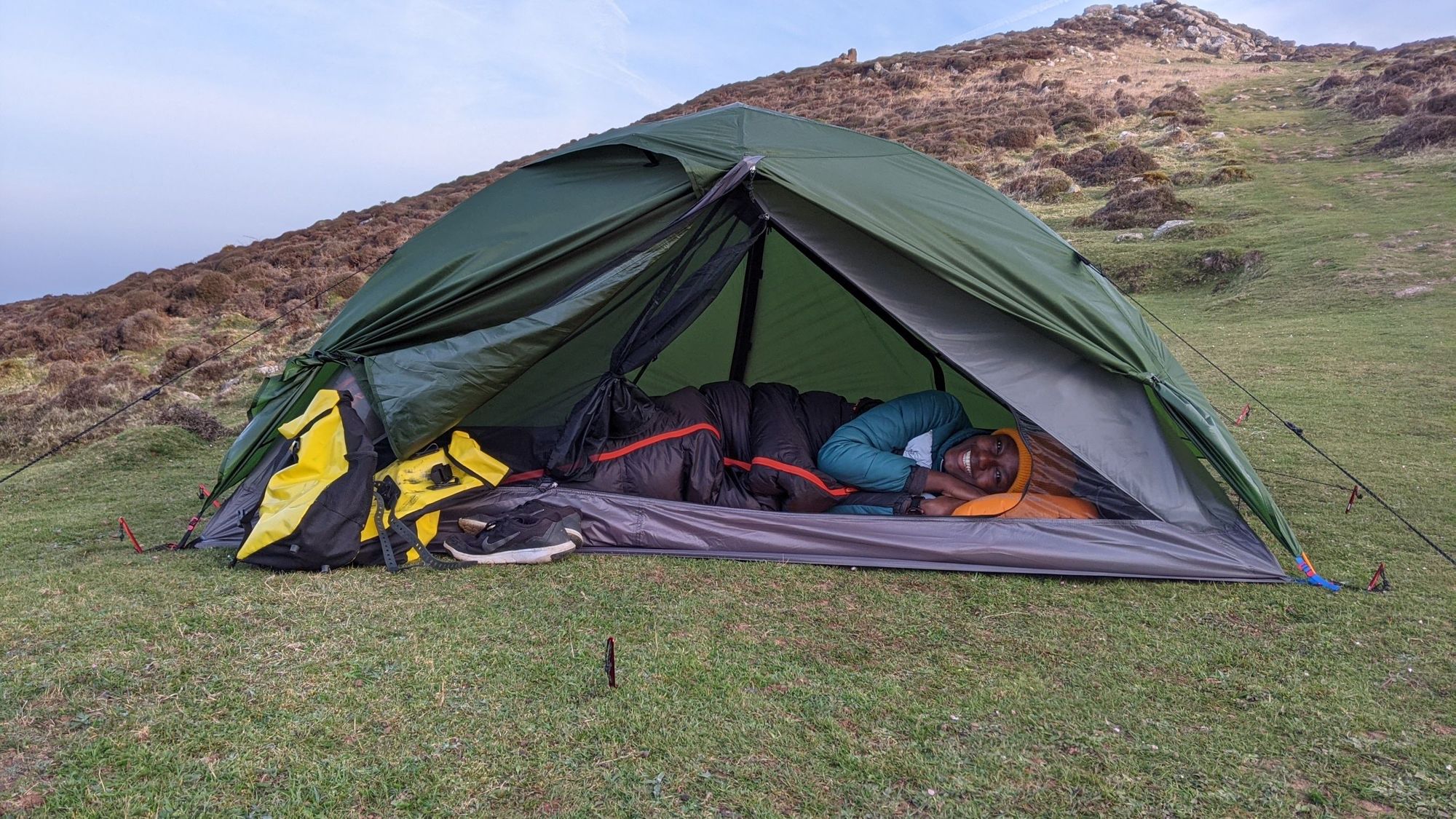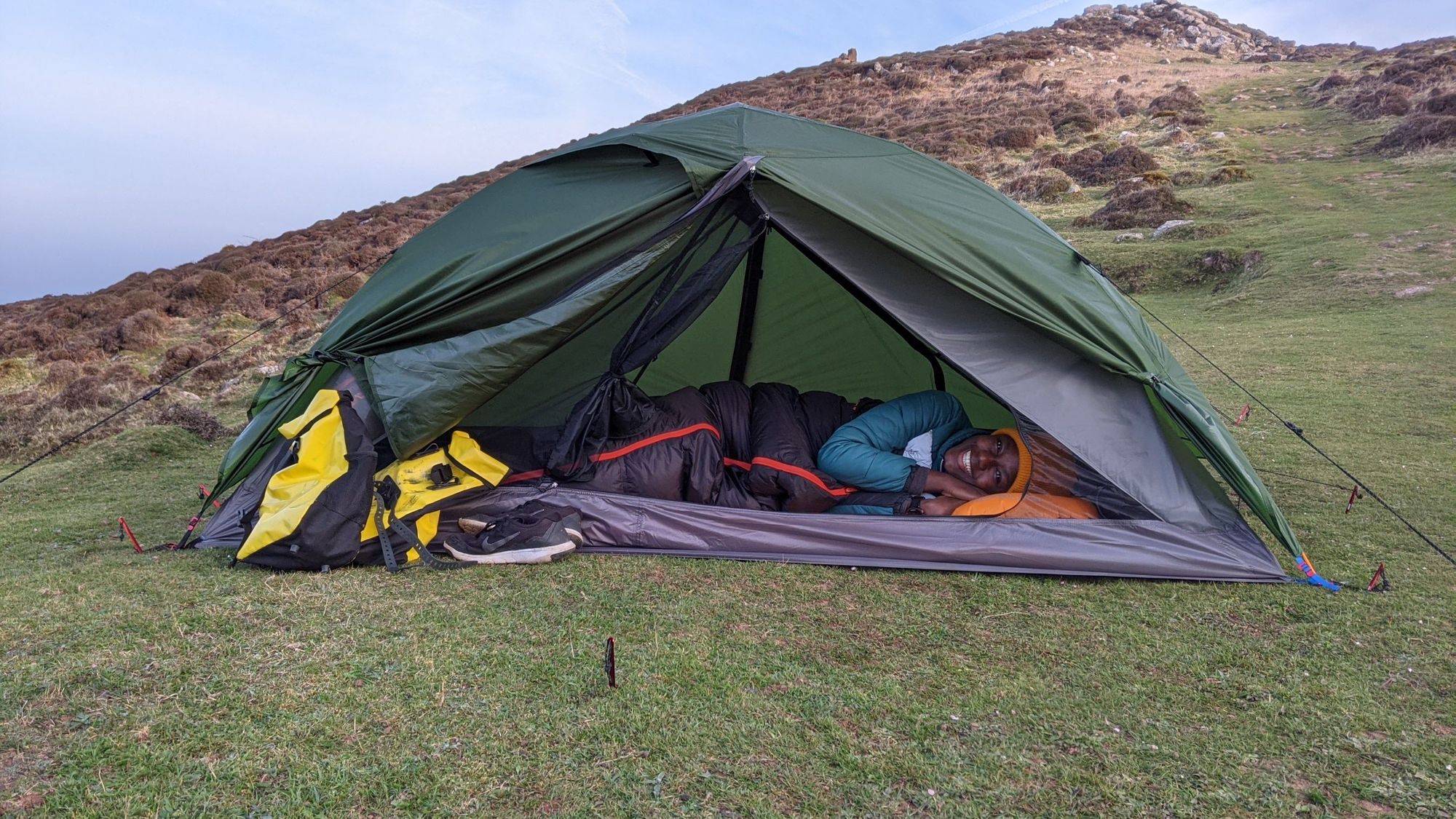
Have you ever scrolled through Instagram and felt jealous of all the people having more adventures than you? As you look with envy at photos of wild camping and epic cycle rides, do you feel like you're not brave enough to try it? It’s not just the physical endurance required to take part, but the sneaking suspicion that you’d fall to pieces without a hot shower and a comfortable bed. Well, you're definitely not alone.
We wanted to find out what it’s really like to embrace a life of outdoor living and type 2 fun. The highs you get while adventuring are all over social media, but we wanted to learn about the lows. How can you get past those cold, miserable moments when all you want is the comfort and security of home? And what do you gain when you do?
We chatted to three adventurous souls about the uncomfortable moments they’ve overcome, and how it’s transformed them in the process. Vera Ngosi-Sambrook tells us all about her journey from (self-described) “fair-weather cyclist” to “dirtbag endurance cyclist.” Artist Lauren Youngs, who lives off-grid in a Welsh woodland, explains how her outdoor lifestyle has made her more resilient. And then there's Chris Lewis, who has spent the last six years hiking the UK’s coastline. Along the way, he has gained so much more than he left behind. Here's how they learned to leave their creature comforts behind - and why you should too.
Learning to Embrace Type Two Fun
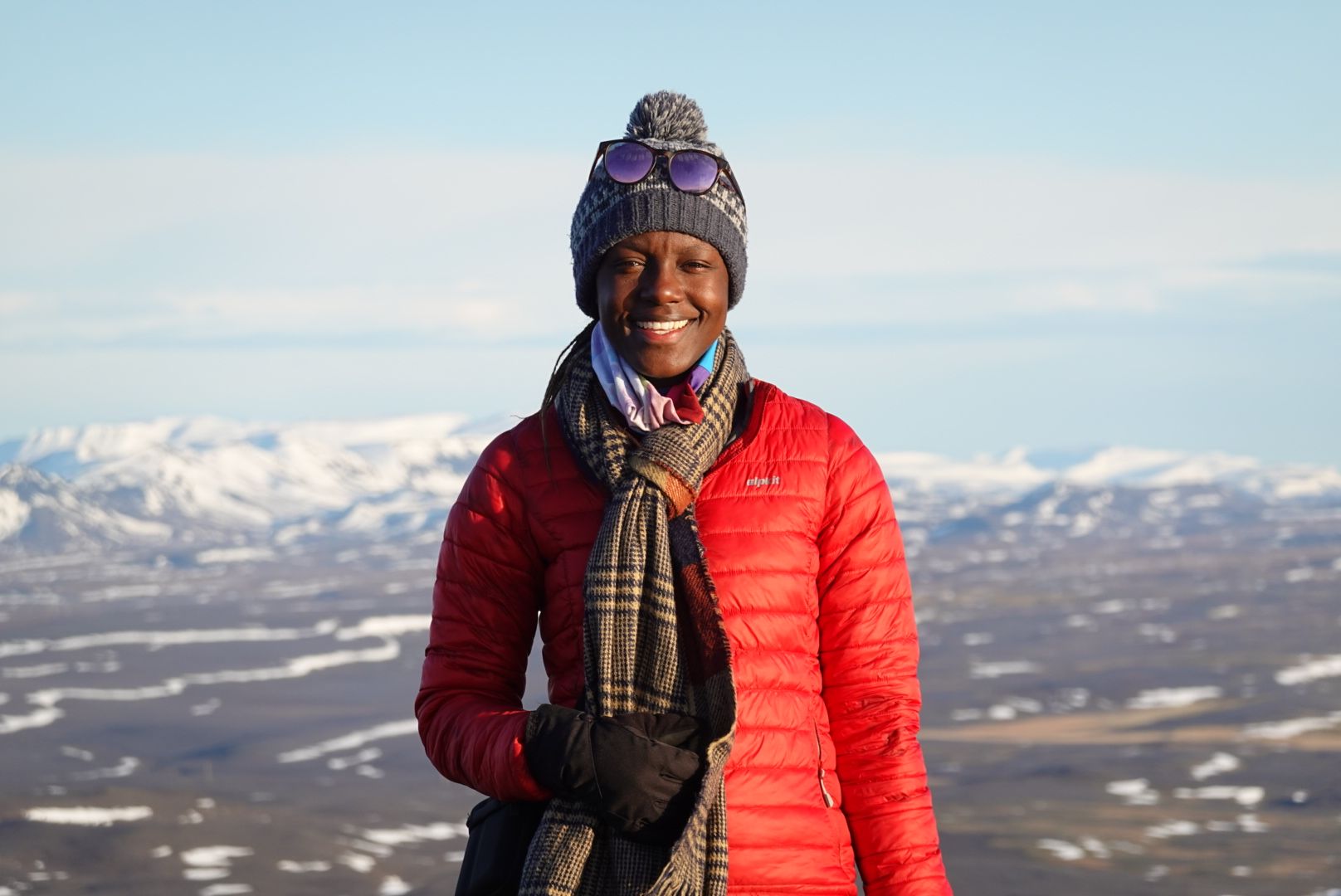
Vera used to go out cycling once or twice a week on rides of 20 to 30 kilometres. But during the pandemic she discovered a community of cyclists on Instagram who pushed themselves much further than she ever did. She expressed a desire to do a long ride to a friend, who sent her a link to the Ultra Distance Scholarship, aimed at increasing diversity in endurance cycling.
“I applied and forgot about it for a month. Then I actually got the scholarship and had a freak out," Vera says. "I found out on New Year’s Day in 2021, and the race was in July. But I decided to go ahead - I wanted to have something to focus on.”
But for Vera, the cycling itself wasn’t the most challenging. Going out in all sorts of weather and camping were very much out of her comfort zone.
I began learning how to live on the road and camp and carry everything with me. That was way out of my comfort zone
“I love my creature comforts,” she says. “I grew up in Malawi and I still find the UK miserably cold. I just want to be under a blanket most of the time with my hot water bottle. But when training for this race, one of the things I needed to learn was how to camp or bivvy. Sometimes you need to just stop for the night and there might not be anywhere to stay.
“I had never even heard of a bivvy back then, but my husband said we could go on a practice ride together. We cycled up to North Wales with this bivvy bag I’d borrowed and a sleeping bag. It was April, one of the last cold spells, and it was freezing. I had to sleep in the icy cold. After that I began learning how to live on the road and camp and carry everything with me. That was way out of my comfort zone.”
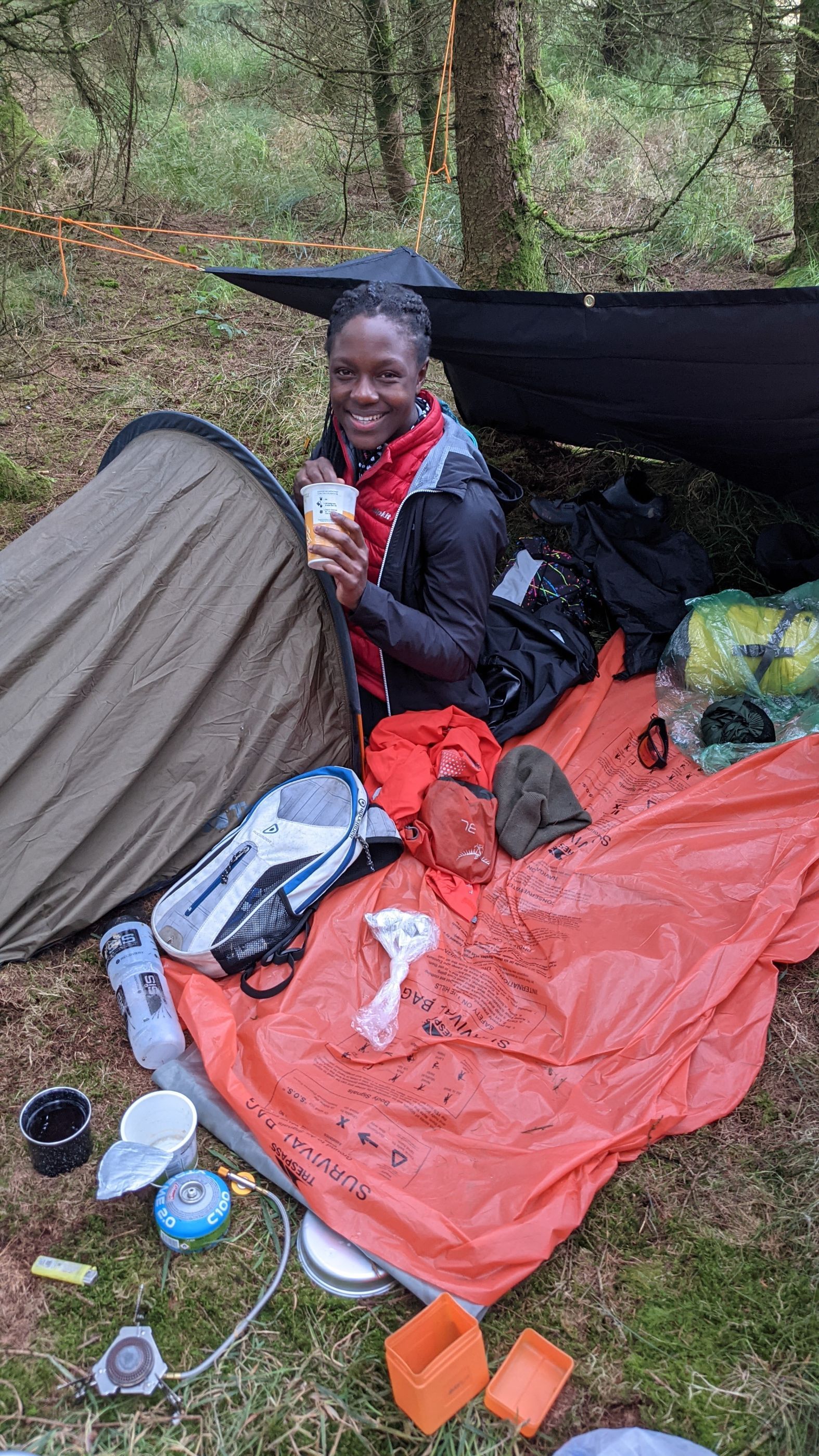
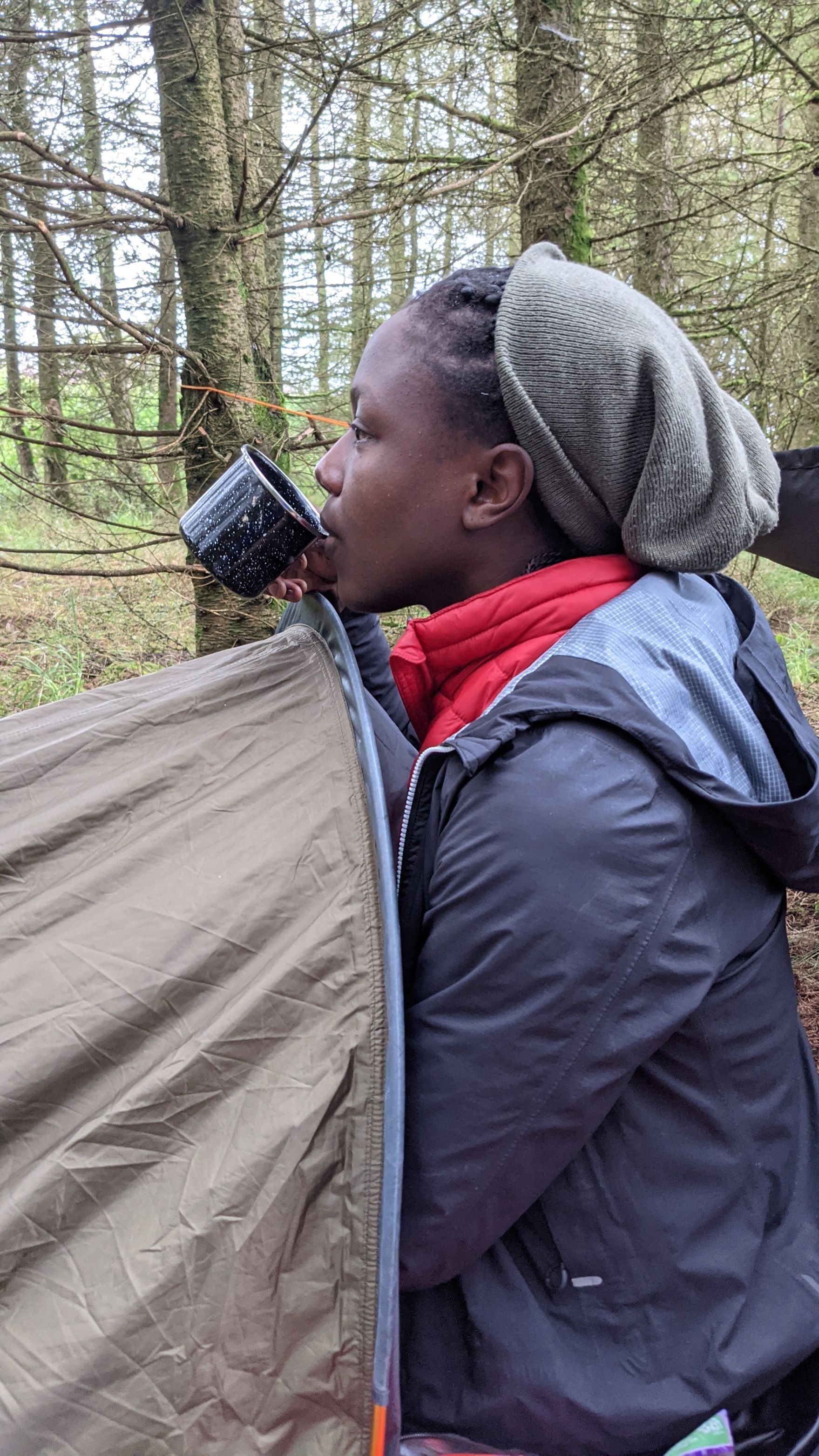
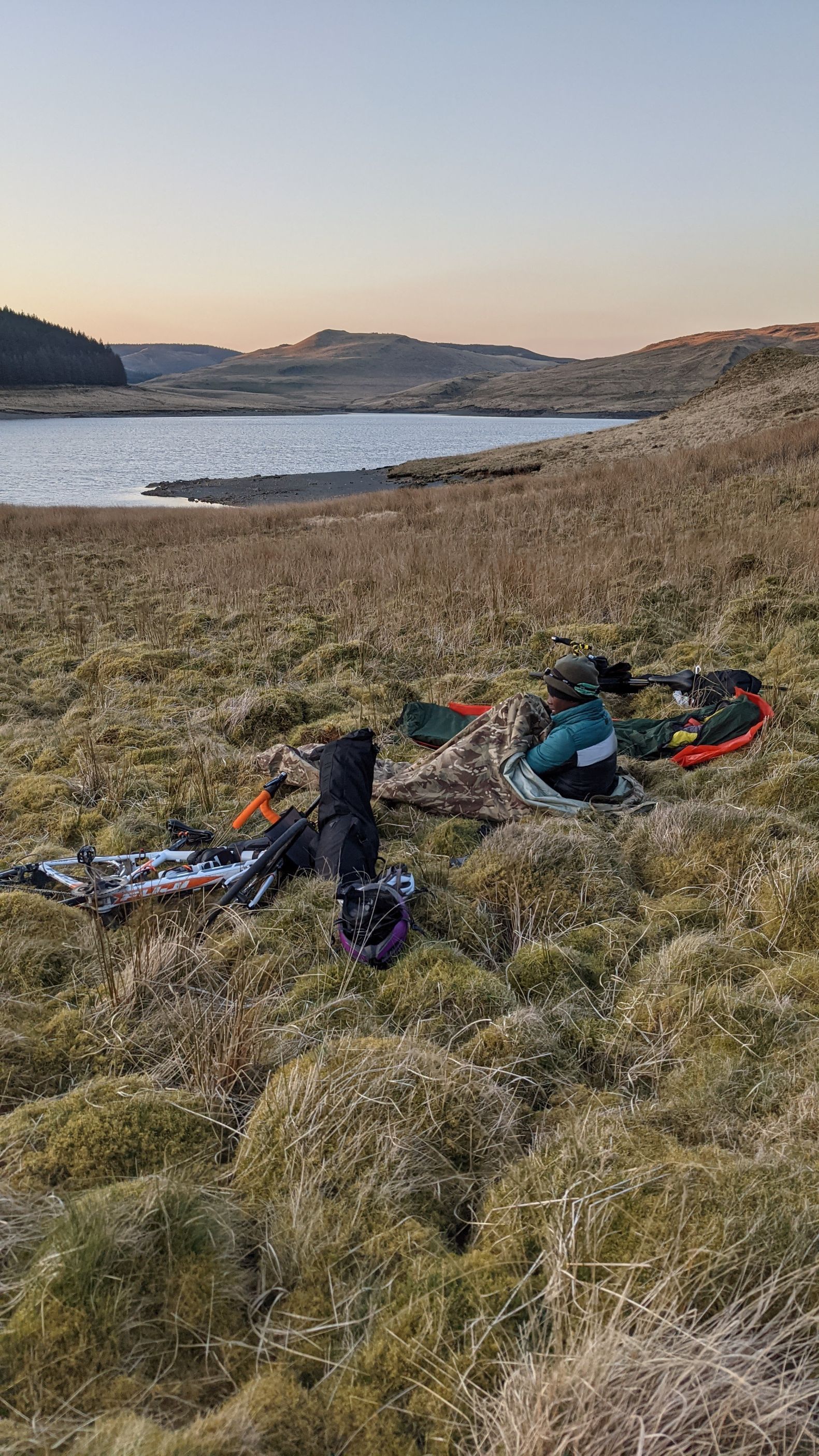
Since finishing the scholarship, Vera has discovered a love for off-road cycling. However, she confesses that she still isn’t completely comfortable with bivvying or the British weather.
It’s also about reminding yourself: this is a choice
“It’s not something I'd say I live for even now. I enjoy it as a challenge, and because when I go back to home the creature comforts are so much better for it,” she says. "I still get those low moments of asking myself, ‘why am I doing this?’ when it's chucking it down and I'm shivering.
“But one of the things that I learned through endurance cycling is that nothing lasts forever. I do positive self-talk quite a lot, and tell myself it's not the end of the world and it isn’t going to last. You have to remind yourself that even if you’re feeling crap right now, you’ll get somewhere warm and feel all the better for it.”
“It’s also about reminding yourself: this is a choice. You might not choose the weather but there’s a gratitude aspect in reminding yourself that you’ve actually chosen to do this, and there was a reason for that.”
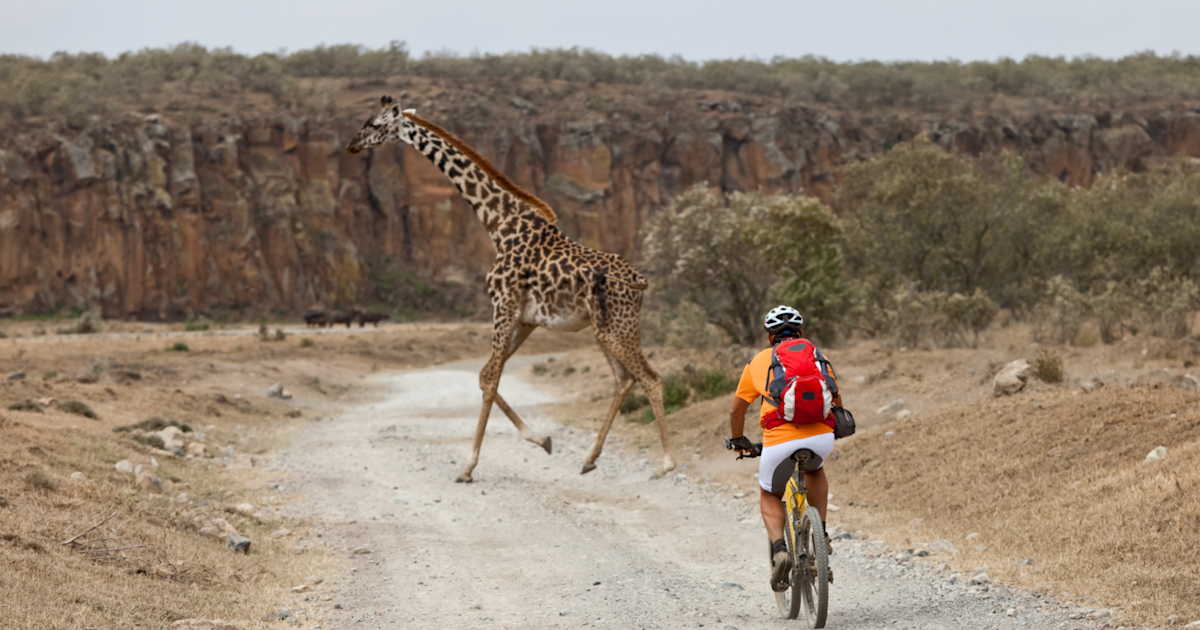
Going Off-Grid
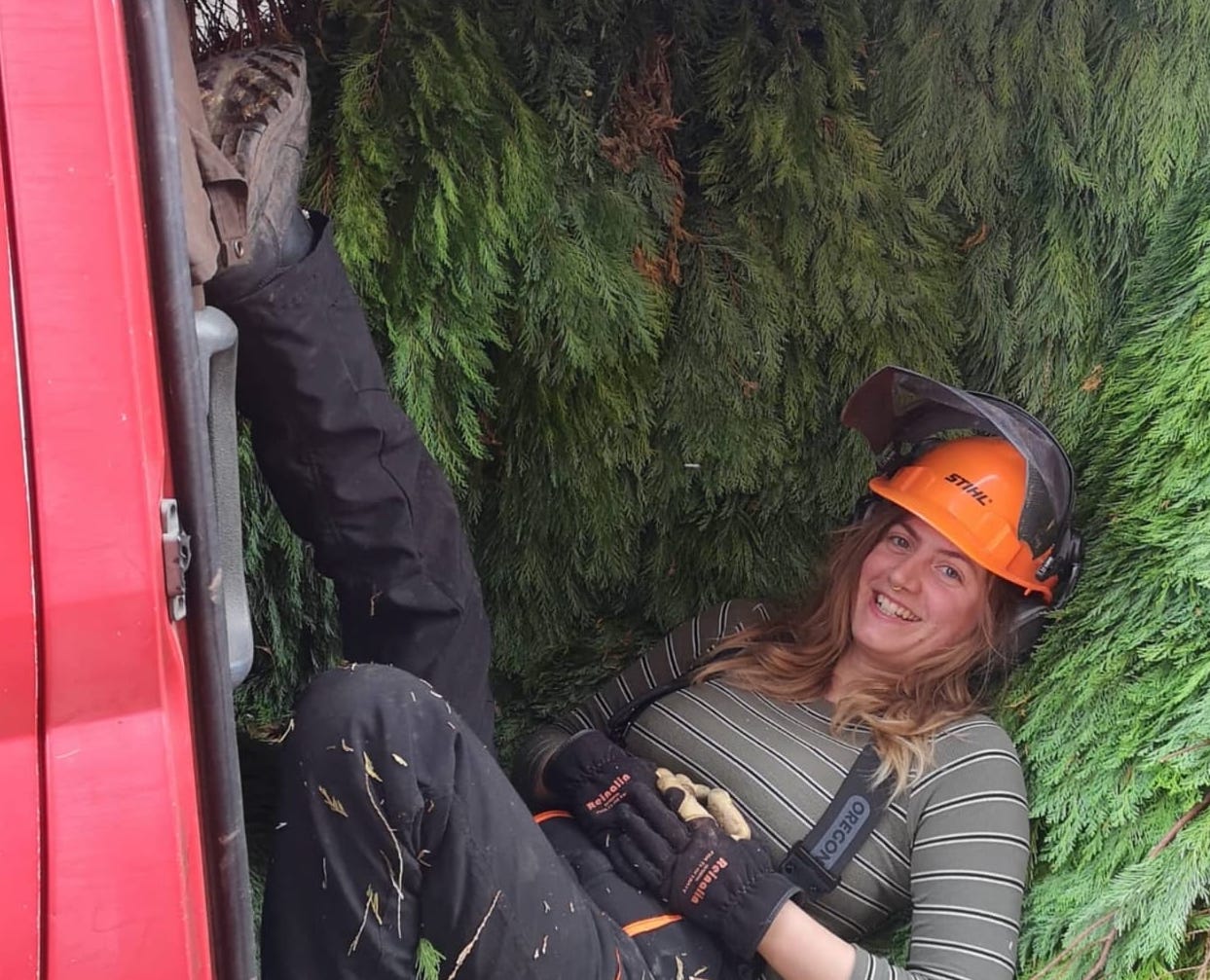
The pandemic also led to a lifestyle change for Lauren. In July 2021 she moved in with her partner Mathew, leaving her London flat to live off-grid in a Welsh woodland.
“I’ve always been outdoorsy since I was a kid, so it felt quite natural. It was amazing to be in the woodlands and run around. It was lockdown, so we weren't working. There was nothing we could do except build stuff - it was amazing.”
We don't all feel great 100% at the time. It's about feeling it, seeing it, honouring it, doing something about it and then getting over it
Lauren and Mathew have gradually been improving their off-grid set up. They keep chickens and pigs. They have a two-sided charcoal shelter with a pitched roof, and they’re in the process of building a shepherd’s hut. At the moment they live in a caravan - it doesn’t have electricity, but there’s a solar powered charger for their phones and laptops.
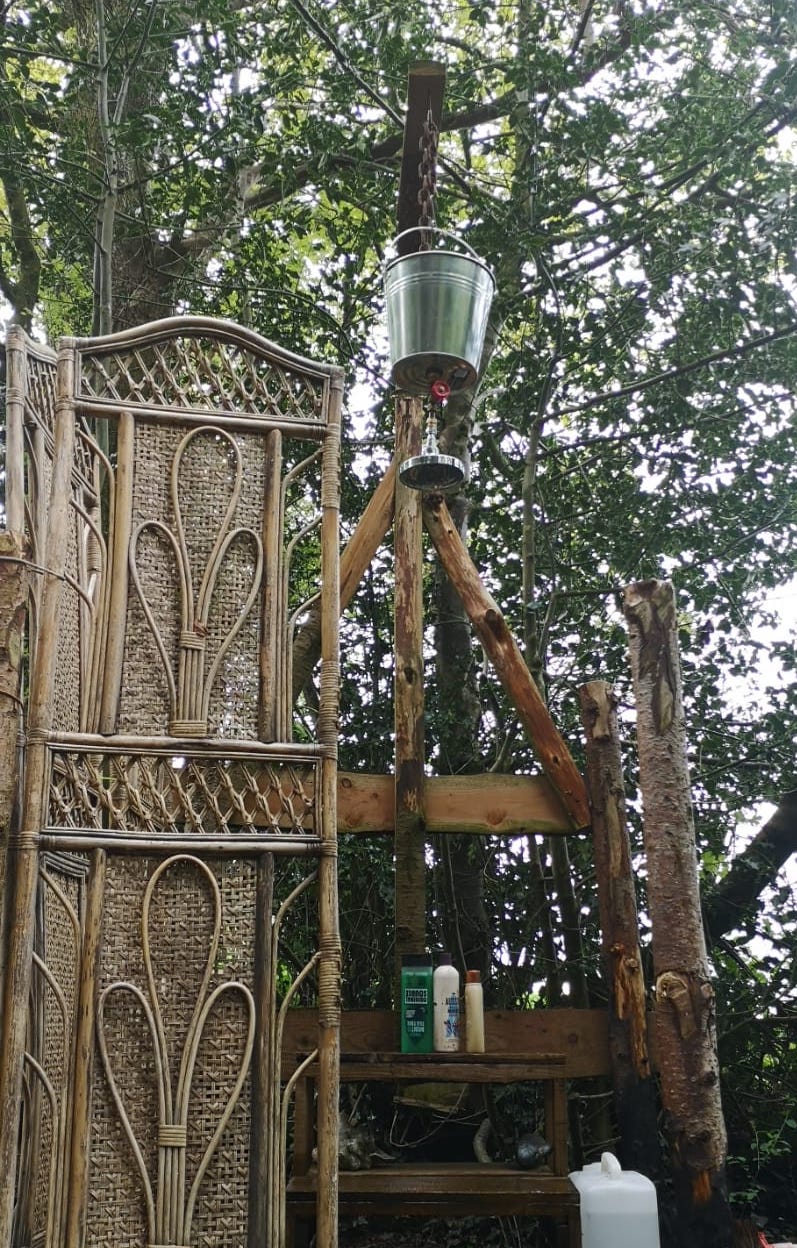
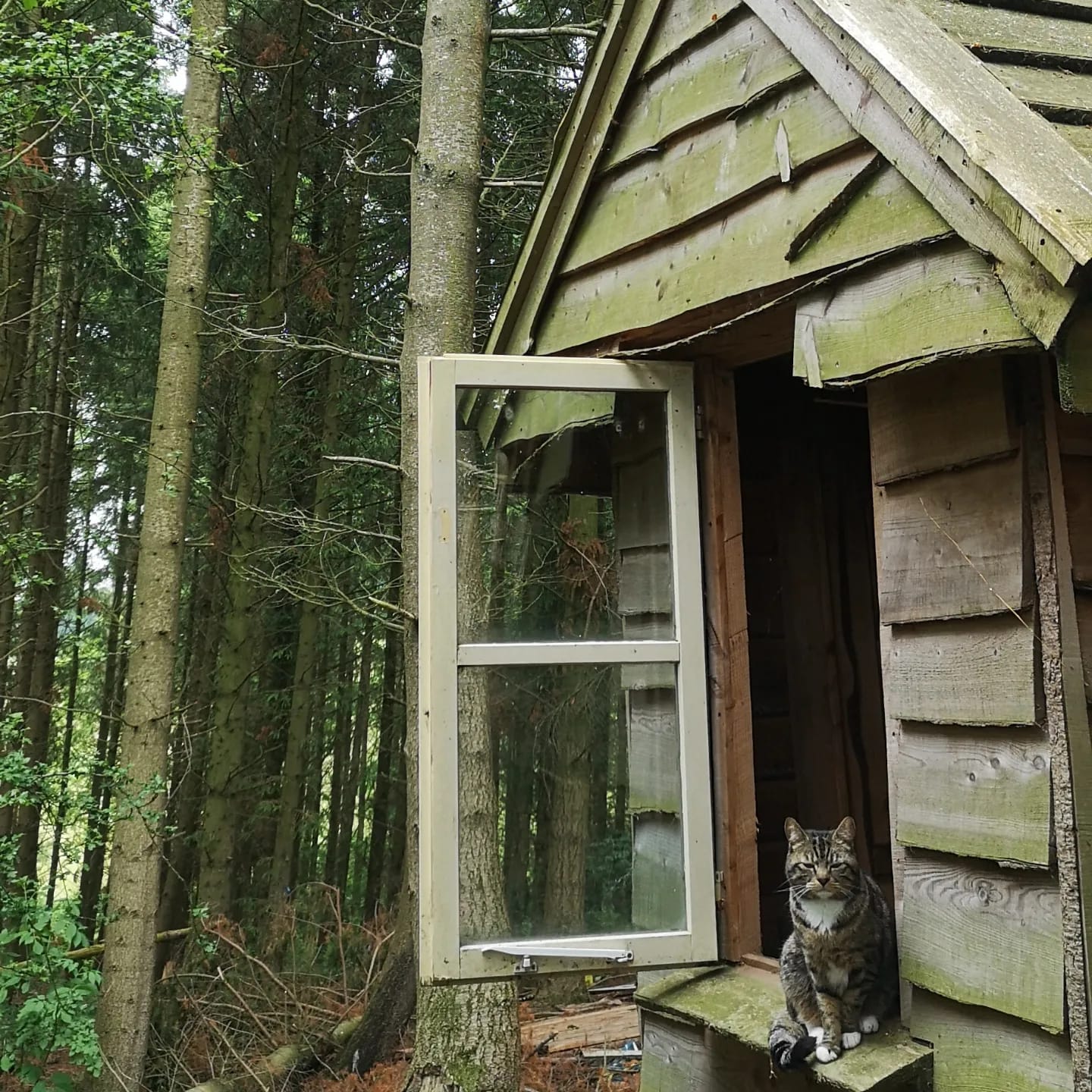
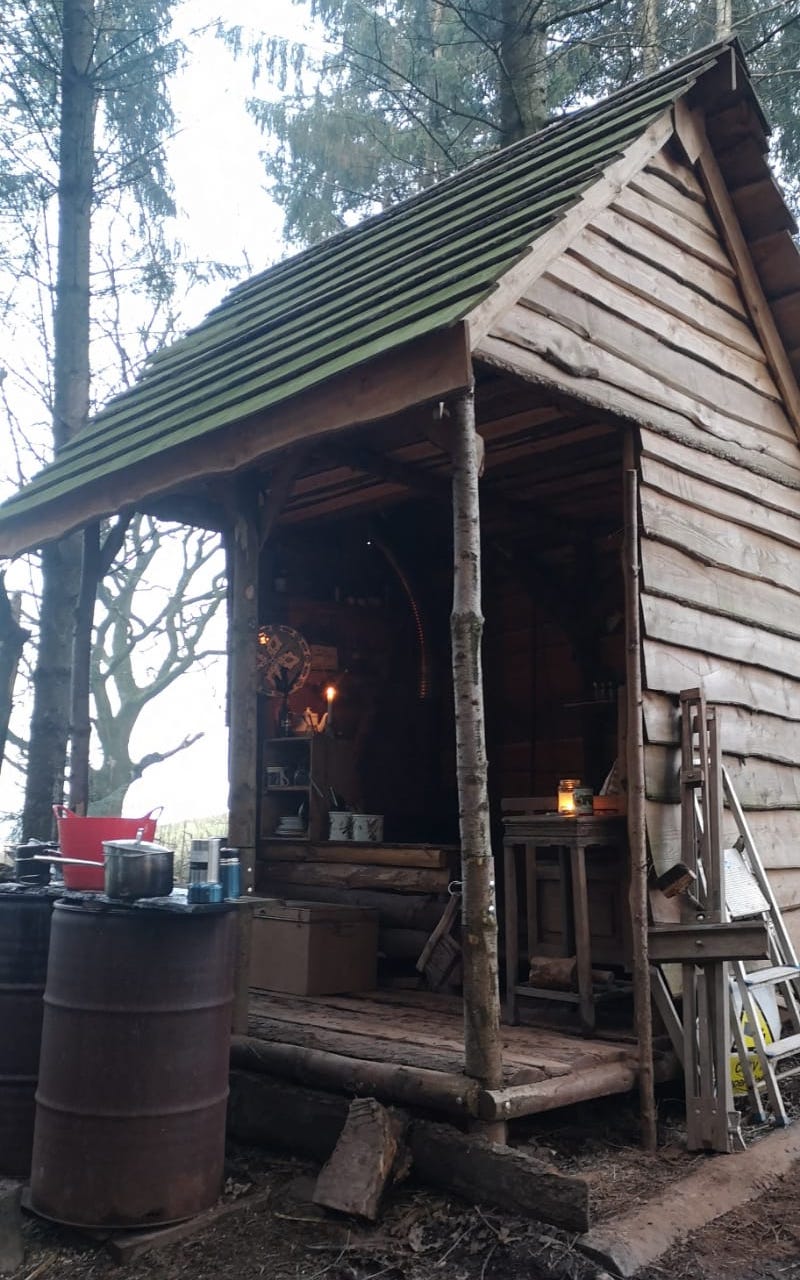
“We have a compost toilet. If you’ve seen the movie Shrek, it’s literally just like that. It’s got the little moon in the door. There's a bit of footage of me on Channel 4, saying something like ‘I never thought I’d shit in a box’,” Lauren says.
“The water is either rainwater harvesting or collected from the stream at the bottom of the wood. Sometimes we’ll buy drinking water but we tend to fill up the bottles elsewhere - the local farm I work at has got a spring.
“Water’s become a bit of luxury. We don’t have a bath - for the winters we have a pump shower, which we charge with the solar panel. We also made an outdoor shower. It's a bucket with a gate valve and a shower head which you can hang up wherever you want.”
Lauren’s the first to admit that there are challenges to off-grid living, in particular, the amount of preparation that goes into it. “Have we got water? Have we got gas? Have we got everything charged? Is the solar panel working? Is it going to be a sunny day?” she says.
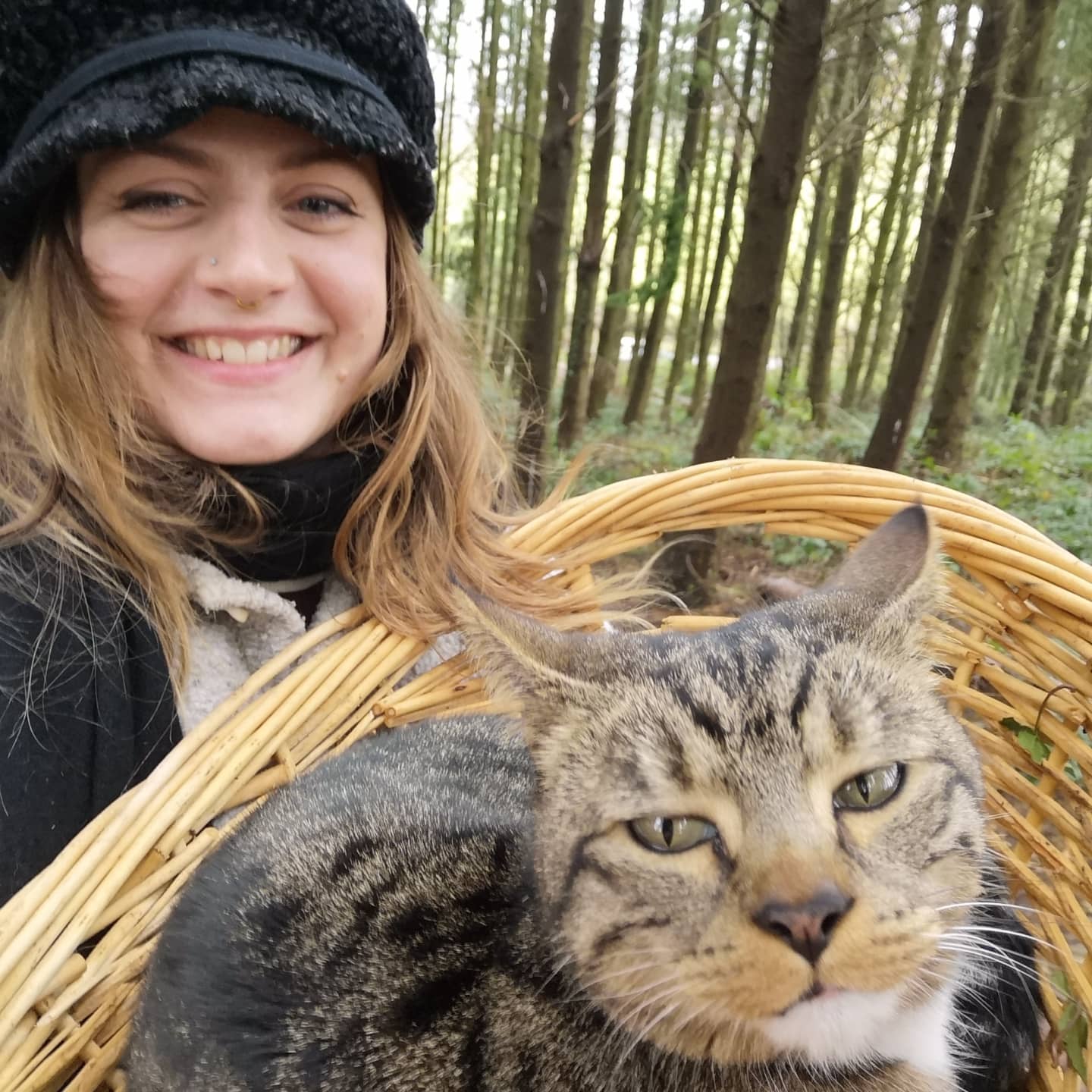
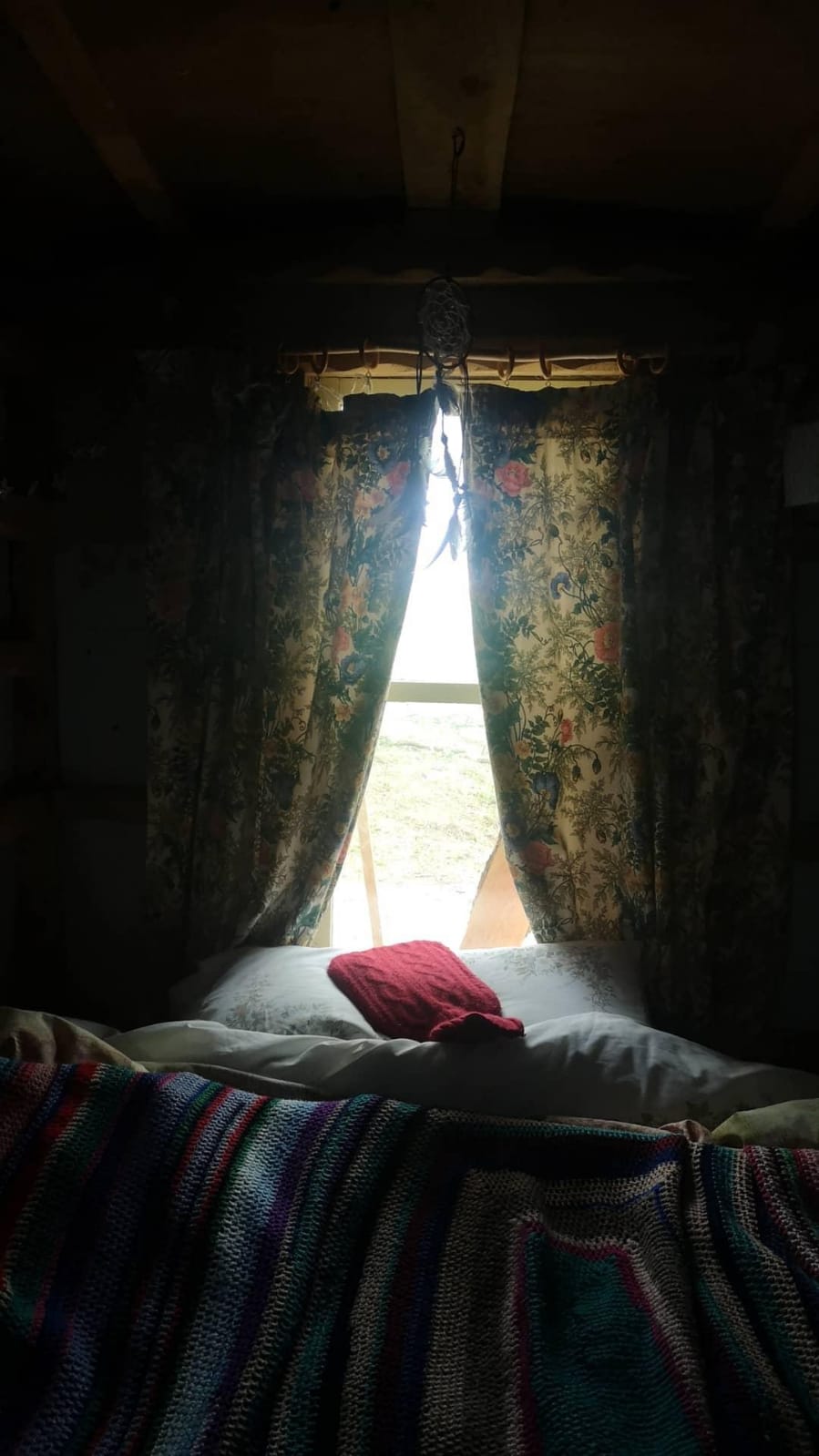
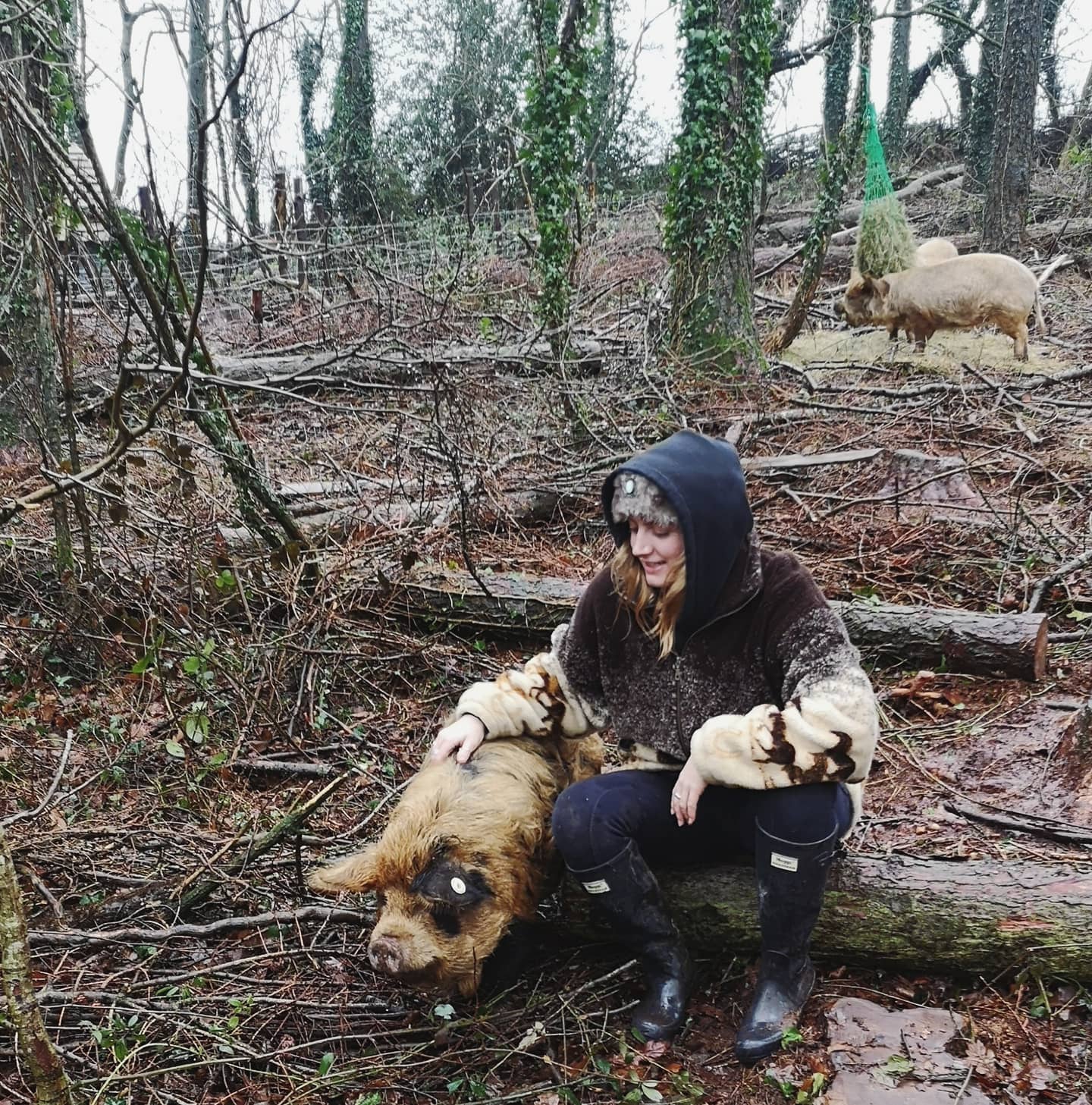
So, no, it isn’t all sunshine and roses. And yes, there are low moments - like when Lauren gets her period. “If I’m not feeling my best I’ll put on my warmest and cosiest clothes,” she says. “I might go for a walk and just look at stuff, like the pigs and chickens. Just find a way to take my mind off it. Or on my period I might get a hot bottle and cuddle up with the cats, eat some junk food and watch something.
“It’s about just allowing yourself to feel crap. We don't all feel great 100% at the time. It's just kind of feeling it, seeing it, honouring it, doing something about it and then getting over it.”
The quality of life here is better than living in a flat in London. When I went to Wales it felt like an upgrade, even though there's all these challenges
For Lauren, the positives of off-grid living far outweigh the discomfort.
“The quality of life here is better than living in a flat in London. When I went to Wales it felt like an upgrade, even though there's all these challenges,” she says. “It’s absolutely beautiful here. It does make you feel very calm. I don't think I realised how unhappy I was until I moved to Wales.”
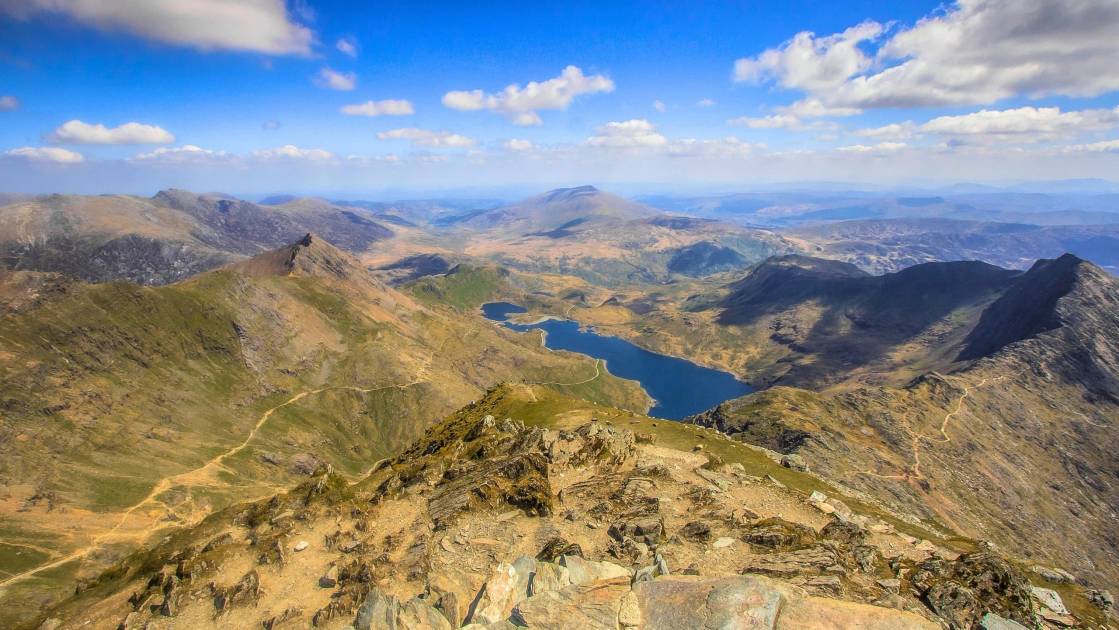
Adopting a ‘Just Do it’ Mentality
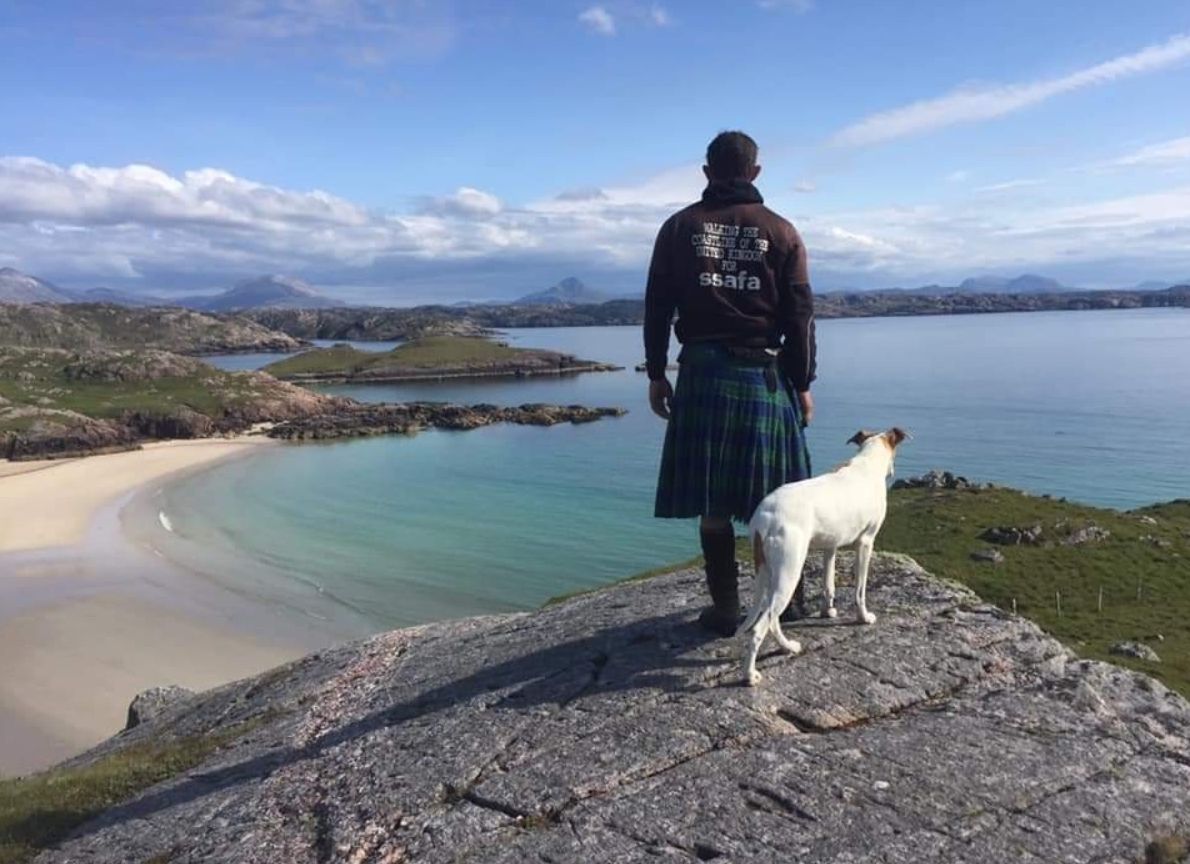
In 2017, Chris Lewis made a decision to walk around the entire UK coastline (including its islands) in 2017 - a distance of some 14,000 kilometres - and fundraise for SSAFA in the process.
“I’d been a single parent for the ten years preceding the walk, and before that I was in the parachute regiment. To cut a long story short, something happened and I started having a real wobble - I had a bit of anxiety and I was definitely depressed,” he says.
"I knew that I needed to make a change - it was that simple - but nothing I did seemed to help. The only thing that always made me happy was when I was outdoors. It was a very last minute decision. I just had an epiphany one day that I was going to walk the UK's coastline. A few days later I was gone’.”
I’d ask myself if I would rather be back in the flat, confined between four walls, depressed with no sense of purpose, or out here being bitten by midges. The answer was an easy one.
Chris describes himself as someone with a ‘just do it’ mentality - he knew that if he spent too much time thinking about what could possibly go wrong then he wouldn’t leave at all.
“There was definitely a steep learning curve, especially at the beginning,” he says. “At the beginning I had no money, so I learned to forage. I was predominantly living off shellfish - limpets, mussels, crab and at times lobster. But the further I got away from home the better I felt - that's what kept me going."
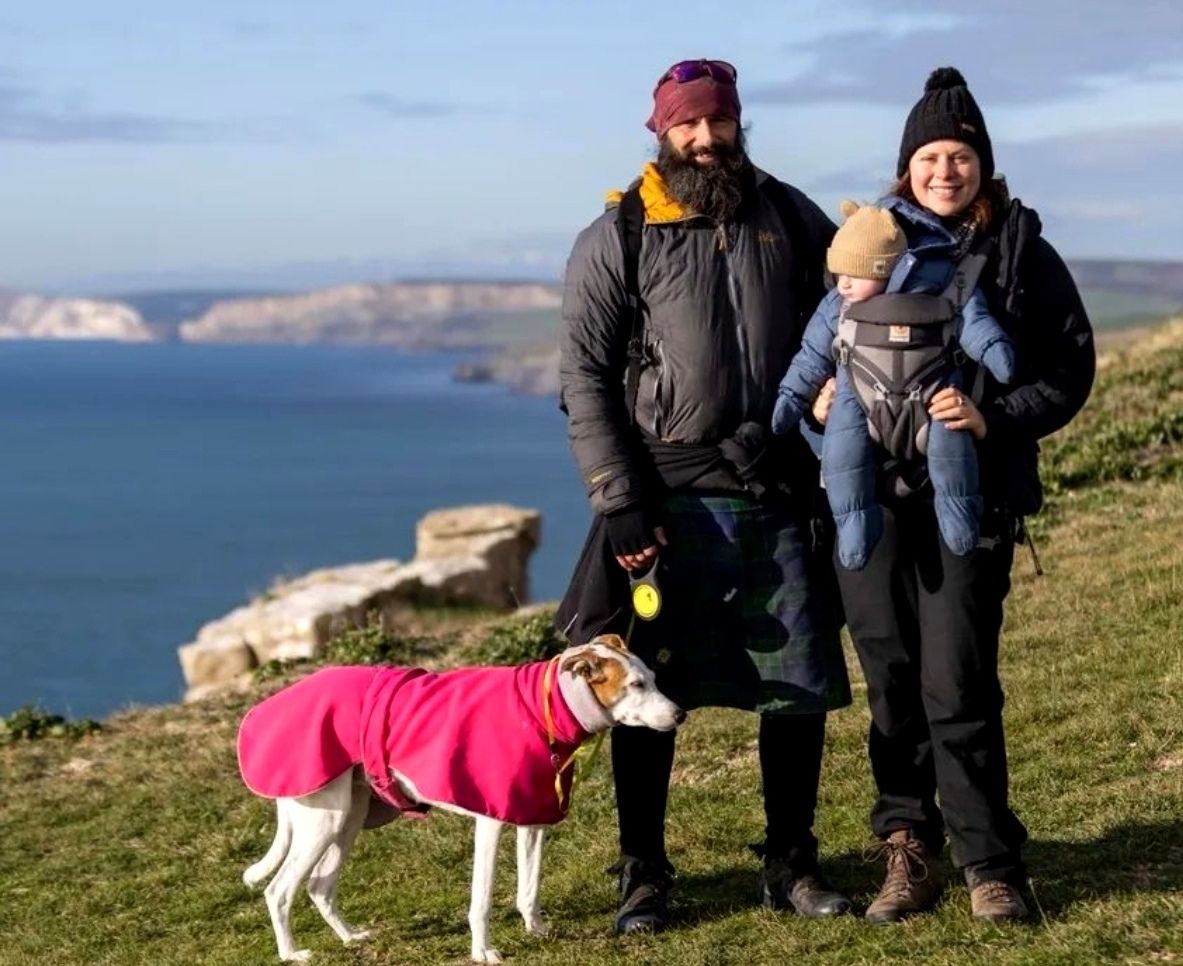
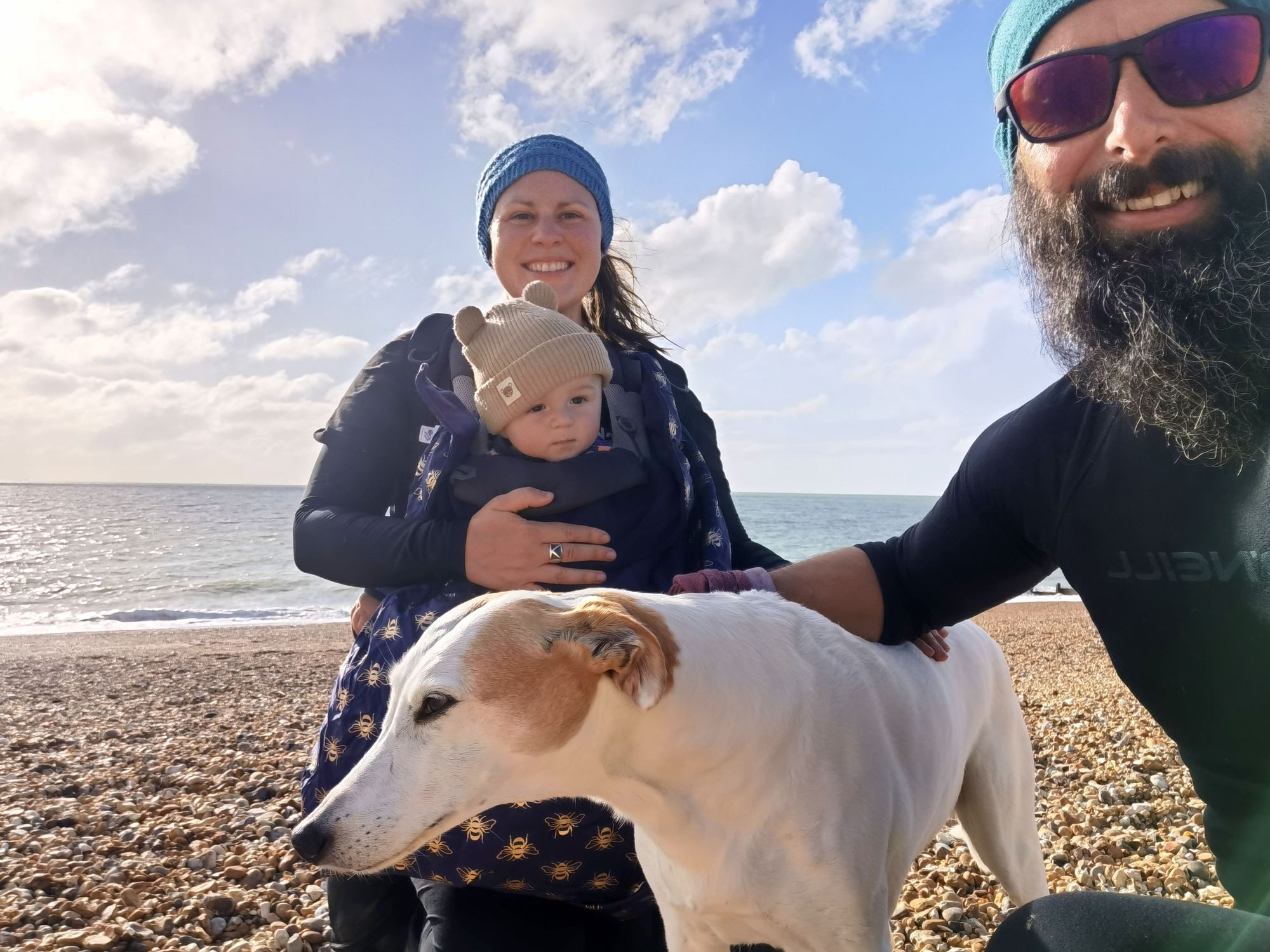
Chris has been on the road for almost six years now. In the process he has adopted a dog, Jet, and met his partner Kate while they were both hiking separately in Scotland. They now have a child, Magnes, and the three of them are completing the journey together.
There’s nothing that can beat a good day out here. But you have to have those crap days to appreciate the really good ones
“During the summer, everyone’s jealous of us,” he says. “In the winter, what we’re doing really hits home. I can’t remember the last time I slept in a comfortable bed, and that has effects on your body after half a decade. People don’t see what it takes to do something like this.
“I find winter slightly easier than summer. You can always keep warm in winter, if you have the right gear and the right knowledge - like where to pitch a tent sensibly. But in the summer, you can’t cool down. We’d have endless nights, even in Scotland, where it didn’t get dark until one in the morning and it was still really hot, and you’re getting eaten to death by all sorts of insects.
His advice to aspiring adventurers about overcoming discomfort?
“Learn to accept the situation you’re in," he says. "I’d ask myself if I would rather be back in my flat, confined between four walls, depressed with no sense of purpose, or out here being bitten by midges. The answer was an easy one. There’s nothing that can beat a good day out here. But you have to have those crap days to appreciate the really good ones. Because that day when everything’s perfect - all the discomfort is forgotten.”
Why it’s Worth It
Chris wouldn’t swap what he’s doing for anything, and certainly not a life of more material possessions. He's happy to weather the occasional storm or hot summer night if it means he gets to do what he loves.
"I’d rather wake up every morning thinking 'yes, this is going to be awesome' than thinking, 'oh no, it’s Monday - I’ve got to wait until the weekend before I can have fun'. Life’s too short," he says.
Lauren won’t be giving up her off-grid lifestyle for the creature comforts of urban life anytime soon either. It’s changed her in ways she couldn’t have imagined.
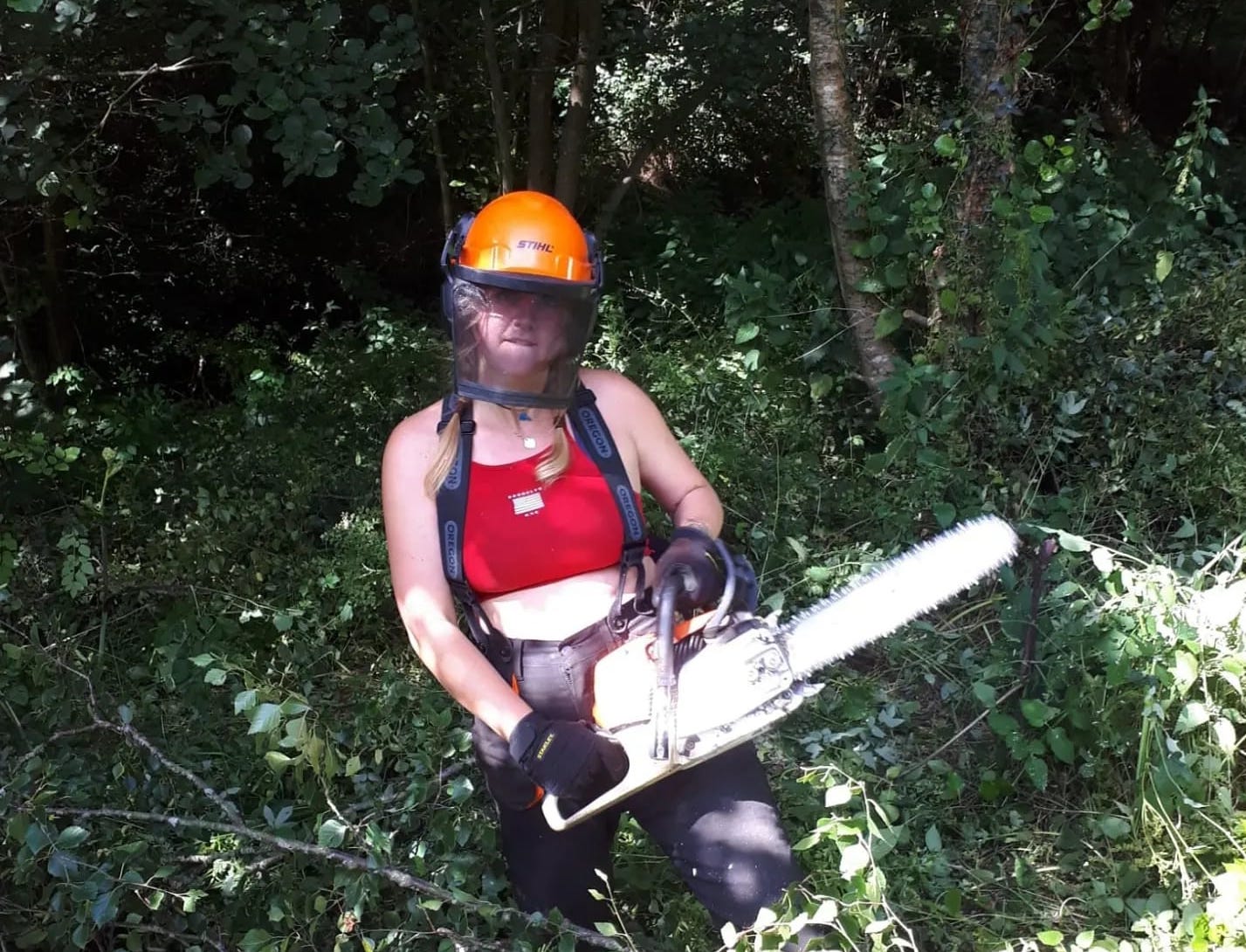
“One of the biggest things I've learned is how strong my body can be,” she says. “And I’m stronger mentally too. I used to find change really difficult - it would upset me to feel I wasn’t in control. In the woods, you’re never in control; nothing goes how you want it to. You just have to sit back and go with it. Now I like the challenge of outdoor living, and having to adapt to that change."
Vera, on the other hand, finds that embracing discomfort allows her to appreciate home comforts all the more.
"I come home and there’s running water in the shower. It’s the best - I feel like I’m staying at the Hilton," she says. "That's why I sometimes take myself out into those other situations because the very basics of home and having a blanket or a warm shower become so much sweeter and more enjoyable.
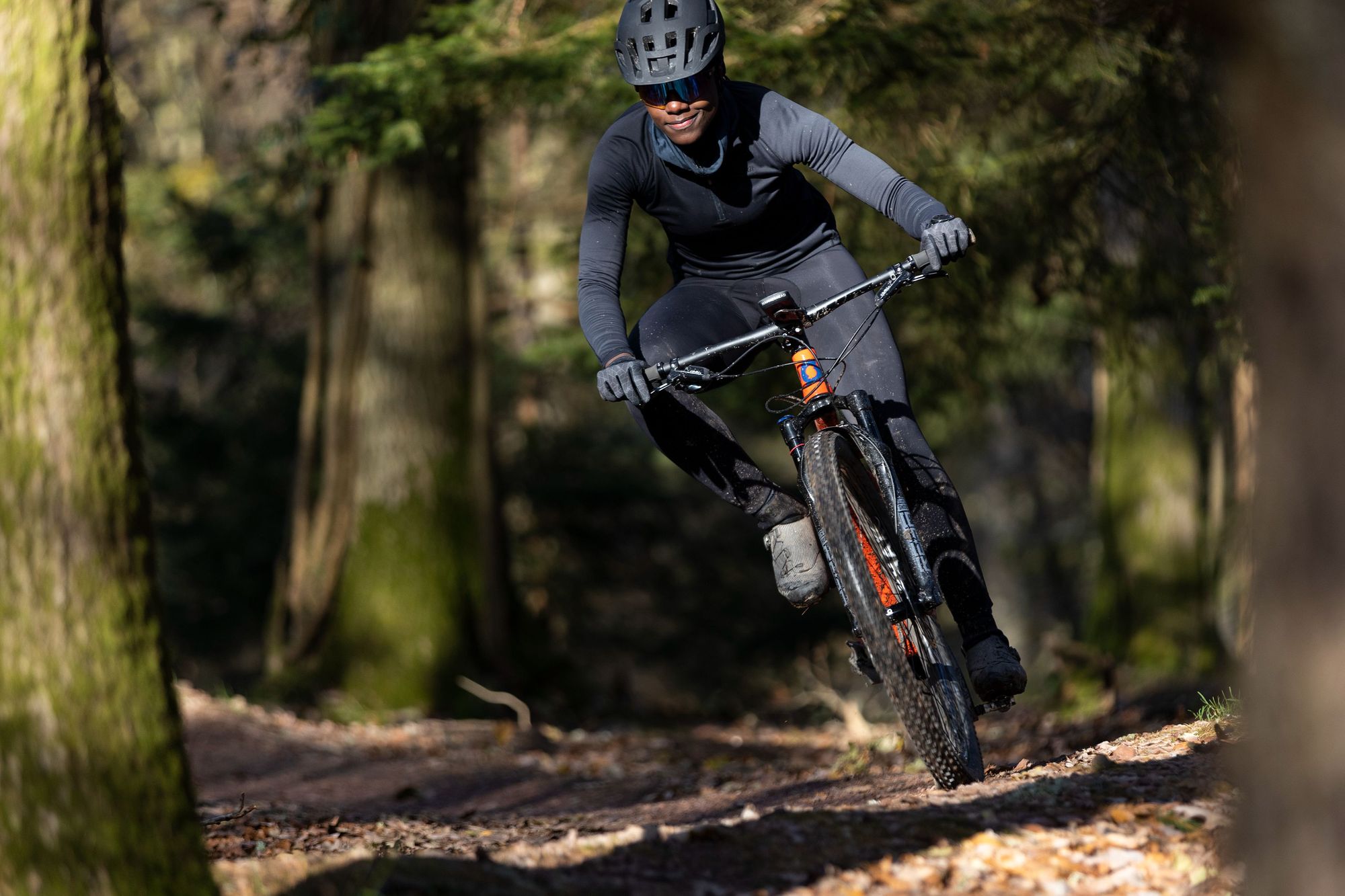
And pushing herself into moments outside of her comfort zone, like a night of bivvying outdoors, have given her so much strength and confidence.
“Sometimes if I stop and think I don’t even recognise who that person is. That strength and confidence transferred to other parts of my life where I was fearful," she explains.
It gave me so much strength and confidence: sometimes if I stop and think I don’t even recognise who that person is
If you’re ready to forgo your comfortable bed or hot shower in quest of living more adventurously, Vera has some advice. She recommends bringing one comfort item with you on your journey to help ground you when times get tough, such as an inflatable pillow or some essential oils. She also recommends starting small.
“Don't have to feel like you’ve got to embark on this big adventure, or even a long weekend,” she says. “Just try an evening close to home. I promise you, it'll be worth it. You never regret it because at the end of the day, you've always got a story to tell. You’ll always remember that night over the time you sat at home on your sofa, doing the exact same thing you do every night.”
Inspired? Pluck up the courage to join us on one of Big Adventures across the world, or our Epic Weekends a little closer to home.


